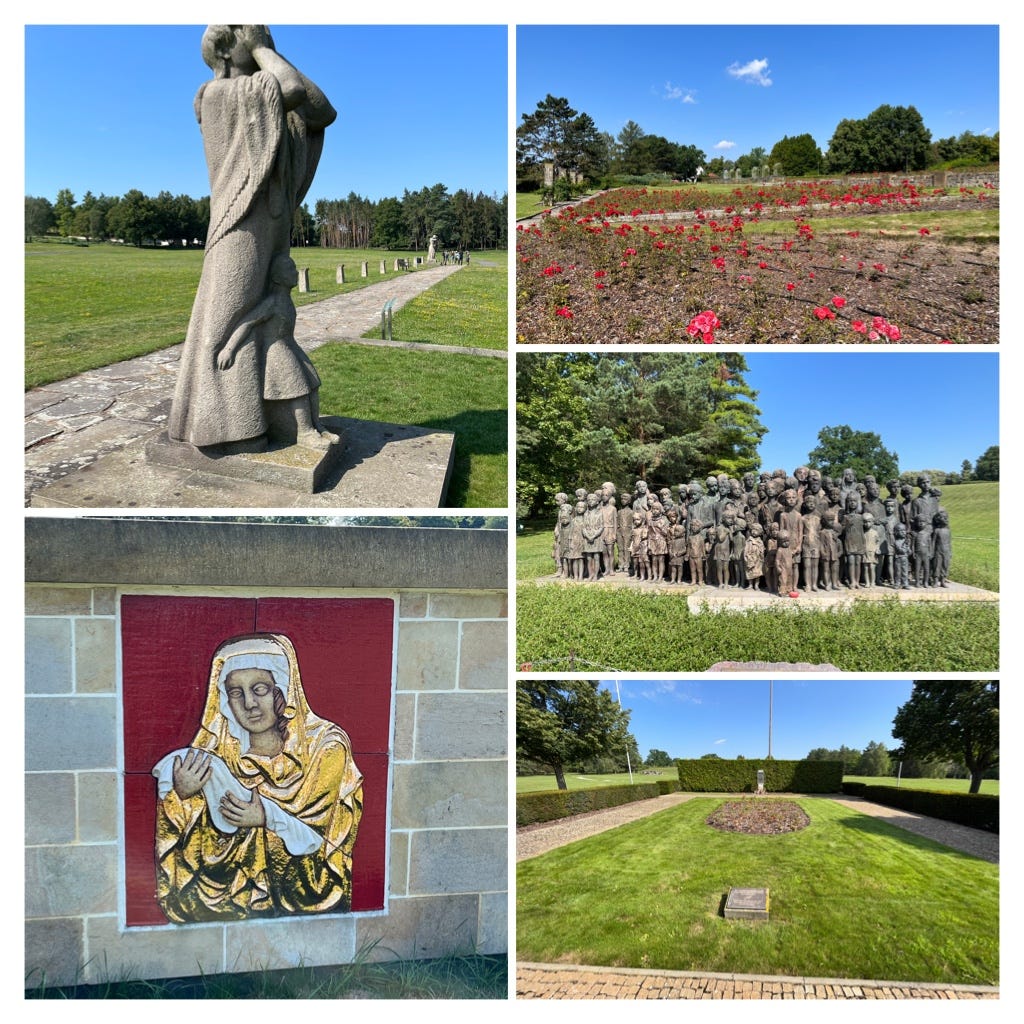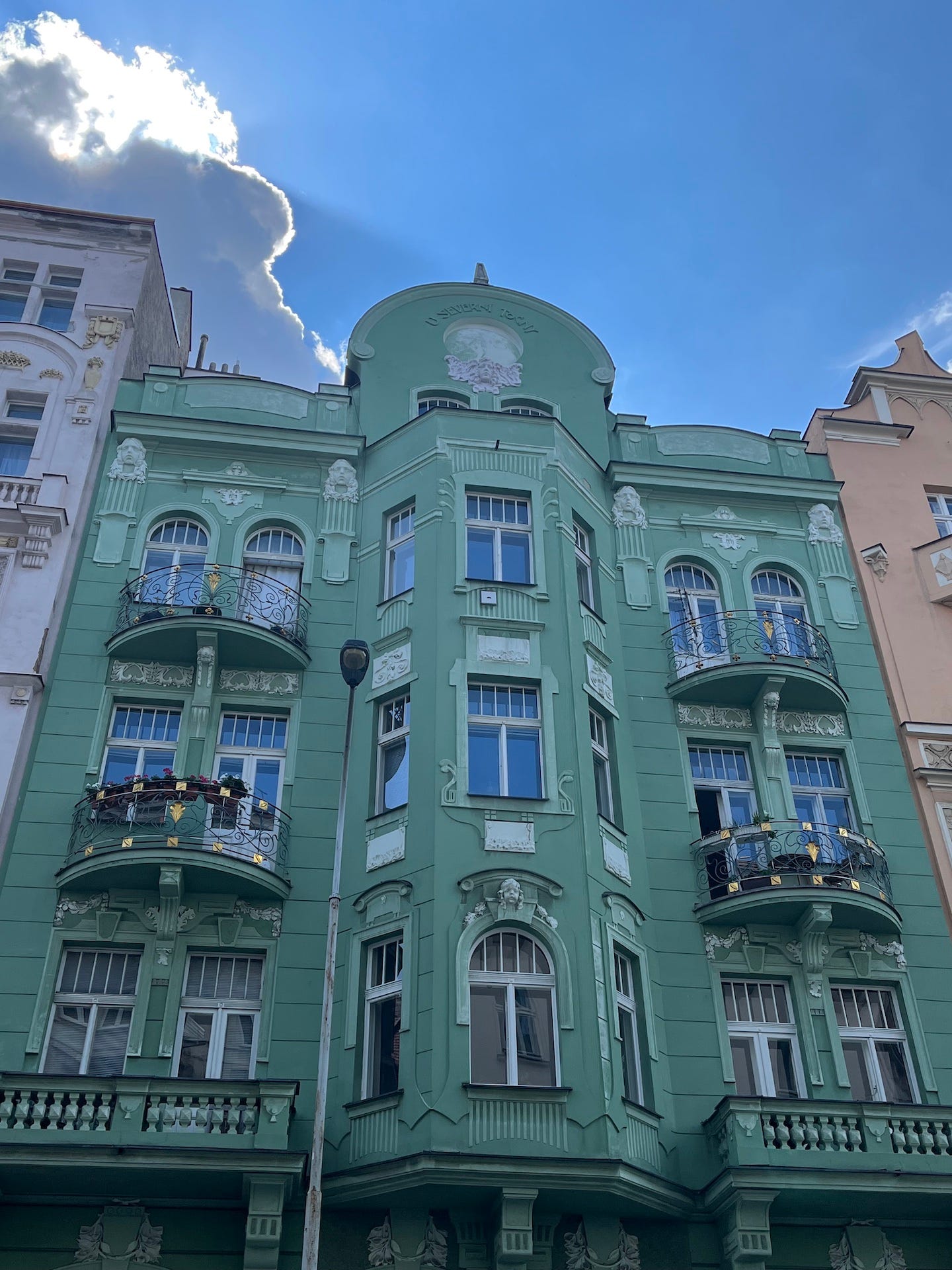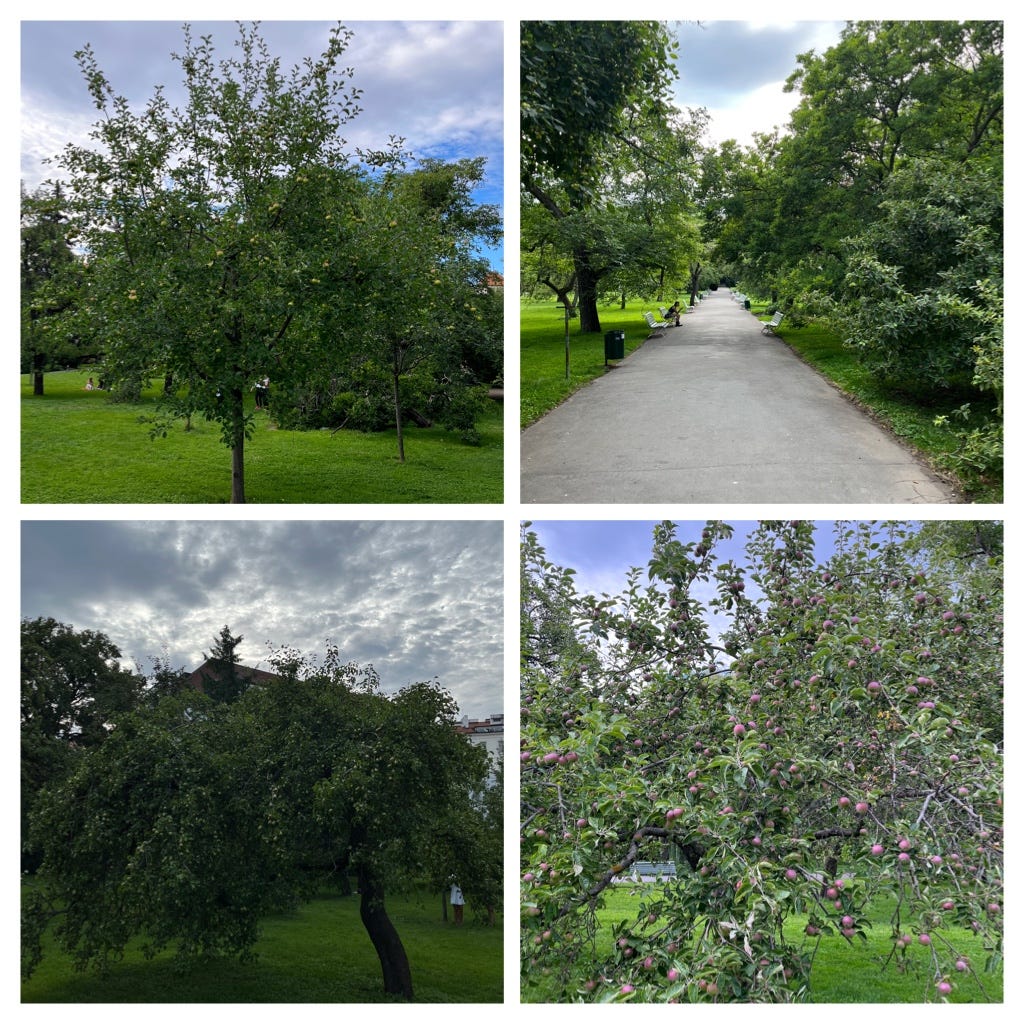Why I sorely needed a summer in Prague
Notes on finding a writing community, family roots, and enduring purpose abroad
When I applied to Prague Summer back in February of this year, I did so out of a kind of existential panic. I’d spent months preparing to leave my profession, and I’m not proud to say that much of that work centered on the identity problem: who would I be without my title, my institutional affiliation, my salary?
The fridge magnet answer to the identity question is that home, not work, is your real life, the real anchor of self. And that is true as the base layer of Maslow’s hierarchy. I admire those who, when asked what they “do,” can reasonably answer, “I do home – I do family,” and have that be enough. But most of us also have aspirations beyond our home lives that reach toward those upper layers of Maslow’s pyramid: esteem and self-actualization.
I have been a writer for more than twenty years. Yet almost immediately after launching the independent career that I had long dreamed of, I felt paralyzed by isolation and grief. Literary magazines are a cavernous void: six months or more of silence that, even for elite writers, often ends with a form rejection. Emails and Zoom sessions with my far-flung colleagues weren’t enough. I needed to live in a community of writers, kneel at the same altar, rekindle my belief.
My friend Evelyn recommended Prague Summer. She had attended years ago, and the result was her excellent memoir Weeds. When I saw that Mark Slouka, a prose writer whom I have long admired, would be participating this year, and after I began serious research into my Czech roots, I saw the program as a chance to probe the identity question in earnest. Would a whole month in Prague affirm my writerly purpose? Or would I whittle the time away, produce little of value, and return home more adrift than before?
I clarified the stakes at the start of this journey, but I left some important pieces out. A month in Prague was a long time away from my wife and children. My three-year-old son held me closer as my departure grew near, nuzzling into my neck as I lifted him from his bed each morning. “You’re my best buddy,” he said, again and again, and I could only squeeze him back and murmur the same. It is hard work caring for young kids, especially in summertime, and I want to honor my wife, my mother-in-law, and my father-in-law for standing in for me. This is the invisible labor we often take for granted — the kind of work that I want acknowledged when I am the one shouldering the load — and so I write this most to my family: to explain how deep the well of this summer abroad has been, how sweet I expect those waters will continue to be, and to say thank you for supporting me.
Finding my tribe
From the first day I sat around the workshop table, I knew I was surrounded by true believers. It was a group with an age range from early 20s to mid 50s, backgrounds as varied as stand-up comedy, courtroom translation, early childhood education, and professional tutoring. Robert Eversz, a screenwriter and crime novelist, led us the first week, followed by Mark Slouka and Maya Slouka, and, finally, Karen Subach. I brought two prose pieces to workshop that were as polished as I could make them, and each time the group found ways to push those projects further while encouraging me to trust my craft. I came away determined to hold out a little longer for an agent to represent the novel I’ve been pitching for the past two years. And it helps enormously to picture those friends around the workshop table – a tangible audience – as I continue developing a fatherhood memoir.
I still believe it is a mistake to believe that I was born for a singular calling. Yet devotion to art requires something like a religious faith. There are times when I lose my way as an artist, doubt myself, and feel utterly alone. A shared purpose is best renewed in community, and that is one thing Prague Summer gave generously to me.
A city for artists
Franz Kafka was right: Prague won’t let you go. I wondered if I might have been romanticizing the city early on, gawking at the spires and ornate facades and pastels that are the very color of dreams. But four weeks later it was still true. Every time I stepped outside, I was engulfed by beauty.
Prague is the city that the mythical princess Libuše prophesied into being: a city whose glory, she said, would touch the stars. It is home to Václav Havel, Antonin Dvořâk, and Wolfgang Amadeus Mozart, whose spirits can still be felt. Some say that capitalism is ruining the place, and that might be true of Old Town and other pockets of commercial glut, but just a block away from the gaudiest tourist trap you can step into a park where fruit trees are laden with apples and pears, and people sit reading on benches, lovers entwined in the grass, and the noise of the city fades beneath a murmuring fountain and the cry of a peacock ranging freely along the paths.
Prague is a place where you don’t feel foolish for loving art, where you come to see that the Czech people have survived Austrian, Nazi, and Soviet occupations because they refuse to trade their birthright of idealism for mere practicality.
Havel’s great heart
It is possible that I would have read Václav Havel again even if I had not returned to Prague, but since I was traveling to his city I brought two of his books along. It must have been the linear time to read and the bold elegance of the place that emboldened me to apply Havel’s vision to academe. As of this writing, that essay has reached more than ten thousand people. The Chronicle of Higher Education republished an updated version last week. I am still receiving DMs, emails, and LinkedIn messages from readers who feel that I was writing directly to them. What greater gift for a writer than to know that he has breached the “world-deafen’d ear” that Matthew Arnold describes, shooting the bolt back in another’s heart, stirring the “lost pulse of feeling” once again?
An ancestral story
I have written at length about my genealogical research and the generous welcome I received in Sokolí during my pilgrimage to Moravia. These stories matter most to me as a father, knowing that my children will share my hunger for memory later in their lives. But traveling to the places where my ancestors lived and died, touching that soil, and meeting strangers who welcomed me like their own family has helped ease the emptiness I felt after leaving a community of colleagues, students, and friends.
Neuroscientists say that identity is a story that we are perpetually telling ourselves. Memory is a pool of all we have lived, tasted, and felt. We tell our stories of self by selecting sensations and images from that pool and blending them into a whole. When we are grieving, the memories of what we have lost take over our story, and sometimes we suffer for years with that emptiness, unable to fill the gaps in our narrative with scenes from our past or present that turn the story toward wholeness.
Knowing where I come from, and seeing those ancestral places thriving again, helps shift my own story from loss to resilience. Even if I never travel the road from Třebíč to Sokolí again, I will carry it with me for the rest of my days. It anchors me.

A deep sense of history
I now live in Pennsylvania, a more historically-minded state than many. Yet much of American history is hidden — if not outright erased, then shuffled off to the edges of our lives, which beat on beneath our Pharoahs: Walmart, Amazon, and Wells Fargo.
For instance, one of the monumental events in American history — the Seneca Falls Convention of 1848, when women first organized to demand the right to vote — is relegated to a tiny museum that does not quite match its name: Women’s Rights National Historical Park. By contrast, Prague protects the many chapters in its past. In fact, the city’s parks and cobblestones and art nouveau facades show a defiant reclamation of liberty after decades of Soviet gray. That liberty is still fresh. I was fourteen years old when the last Russian tank rolled out of Prague.
I’m not sure Americans can understand what it meant for Czech people to have been governed by the Austro-Hungarian empire for more than three centuries, to have been liberated briefly at the end of WWI, when Tomáš Masaryk became the first president of Czechoslovakia, and for that freedom to end just 20 years later with the Nazi invasion. While the Soviet occupation looms larger in Czech memory, the country still bears the scars of those six terrible years of Nazi rule, as I learned during a day trip to Lidice and Terezín.
Lidice was completely obliterated in 1942 in retaliation for the assassination of Reinhard Heydrich, a top Nazi leader. The Lidice school was bombed, all of the men older than 15 were executed, and the remaining inhabitants, roughly 300 women and children, were sent to a detention center, where many of them were later transported to concentration camps. To ensure that survivors would never be able to rebuild their home as it was, Nazi soldiers rerouted the river, a level of spite that I found particularly raw.
A new town was built, and memorials erected to honor the dead, but a great heaviness still hangs over the place. To stand near a mass grave, to see the foundations of a school where children were blown to bits less than a hundred years ago, and to walk among roses struggling to survive a prolonged drought is to feel that Lidice’s sorrow is inescapably one’s own.

Terezín became an Austrian stronghold in the late 1700s, when Joseph II built a fortress around the town and named it after his mother, Maria Teresa. These fortifications turned deadly in 1940 when Nazis transformed the town into a Jewish ghetto and repurposed the military fortress as a concentration camp.
The prisoners at Terezín were put to work building railroads and producing other valuable goods before being transported to extermination camps. More than 19 languages were spoken there, as Jews and war prisoners from across Europe passed through the ghetto. Known as the “Kingdom of Deceit,” Terezín was a place where musicians and artists practiced their craft in the face of certain death, knowing that their resilience also fed Nazi propaganda to hide the horrors of the camp. Look at these people making music, the films said. They are happy. Work sets them free. The more brutal aspects of the camp – starvation, disease, and guards kicking prisoners to death – were forms of savagery that I found sadly predictable. But allowing a prisoner to create beautiful things – the highest expression of humanity – and then twisting that art into a lie captured Nazi cruelty more than anything else for me.

We think of wars as drawn out, years-long conflicts, but what still haunts me about Lidice and Terezín is the rapidity of their transformations. The sudden and total destruction of Lidice and the speedy makeover of Terezín feel eerily similar to the way COVID lockdowns changed reality overnight: freedom one day, a terrifying new normal the next.
I feel an urgency at WWII memorials to hone in on something comprehensible, not the epic scale of horror which threatens to numb by abstraction, but something small and finite that one might recall in the future, perhaps to say Look! It’s happening again. This time it was the knowledge that one terrible climate event, another runaway virus, or a more carefully planned attack on the U.S. capitol could turn my own backyard into a Lidice or Terezín in a matter of days.
—
It was a joy to embrace my family after a month away. My son vibrated with excitement when I picked up him from daycare, and my daughters both leaped into my arms when I surprised them at their theatre camp. Without a doubt, they are my home, my real life. Yet the month abroad also fed me in ways that I sorely needed. I heard a preacher say once that you don’t have to go to church to be a Christian, but that if you are a Christian, you’ll want to go to church. The same is true for most writers. You can write for weeks, months, alone at your desk, but at some point you’ll crave community with other artists. It is the basic impulse that drives readers and writers alike: to know that we are not alone.




A great article. The desire to find one's tribe - with the accompanying excitement, need, despair, joy - rings true and when juxtaposed against your visit to Lidice and Terezín makes human existence all the more poignant. Thanks.